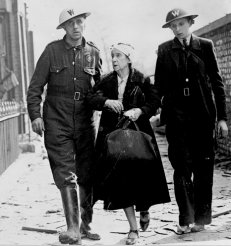|
This
is a page within the www.staffshomeguard.co.uk website. To
see full contents, go to SITE
MAP.
|
INTRODUCTION
(2)
THE
DEFENCE
OF GREAT BRITAIN’S
POPULATION
|
For many years the possibility
of overwhelming attack from the air had been regarded as the
biggest threat to Britain’s security and its population. Memories
of Great War bombing led in 1924 to the forming of a government
Air Raid Precautions committee. After the rise of Hitler and
the increasing rearmament of Germany, concerns grew throughout
the 1930s particularly after the murderous bombing raids on
Madrid, Guernica and other Spanish towns during the Civil
War which started in 1936.
By the outbreak of war much preparation had
been done and an organisation established for the protection of the population which encompassed the
police, the Auxiliary Fire Service, the Women’s Voluntary
Service and other services responsible for rescue, ambulances,
first aid, gas decontamination and repair and demolition,
all under the title of the "ARP". It appointed thousands
of ARP wardens (like Warden Hodges in "Dad’s Army").
The job of a warden in the event of an air raid was to judge
the extent and type of damage and report back on it to the
local control centre; and then to help those affected
for the protection of the population which encompassed the
police, the Auxiliary Fire Service, the Women’s Voluntary
Service and other services responsible for rescue, ambulances,
first aid, gas decontamination and repair and demolition,
all under the title of the "ARP". It appointed thousands
of ARP wardens (like Warden Hodges in "Dad’s Army").
The job of a warden in the event of an air raid was to judge
the extent and type of damage and report back on it to the
local control centre; and then to help those affected  to
a suitable shelter and safety. He or she would also enforce
defence regulations such as observance of the blackout in
the area. to
a suitable shelter and safety. He or she would also enforce
defence regulations such as observance of the blackout in
the area.
Simultaneously with the evolution of these defensive measures,
the long tradition of amateur armed forces in the British
Isles had in contrast almost come to an end. This tradition
could be traced back to the 17th century and had manifested
itself in various forms including volunteeer corps, yeomanry
and Territorial Associations. In 1936 small National Defence
Companies were formed with the intention of giving old soldiers
the task of guarding strategic points at a time of national
emergency but these withered due to official apathy and lack
of funding. Only a few thousand volunteers had joined and
recruitment was suspended shortly after war broke out in September
1939.
With the advent of war other voices, particularly that of
Winston Churchill, at that time First Lord of the Admiralty,
called for the establishment of a force which he called "a
Home Guard". At the same time men of a similar mind were
on their own initiative forming unofficial groups. But as
the Phoney War continued and the threat of any invasion appeared
remote in the extreme this enthusiasm faded.
The onslaught in the West changed everything. The preoccupations
with the possibility of aerial attack remained of the utmost
importance, being reinforced by the Luftwaffe's destruction
of Warsaw and what was shortly to happen to Rotterdam.
But now, in May 1940, an even greater threat loomed over every
man, woman and child. Poland had been overrun in weeks; and
it was becoming clear that Holland, Belgium and even France
were about to suffer the same fate. For the first time since
Napoleon the country faced the real possibility of invasion,
occupation and subjugation, something which only a few weeks
earlier must to most people have been unthinkable. Many men
were clearly determined to do what they could, with or without
official support, to defend their homes and to protect the
country against the threat of espionage, sabotage and incursion
by parachute attack. Both they and the Government were now
well aware that desperate measures were called for. Official
reaction was not long in becoming apparent.
The country was about to witness the birth of
THE
HOME GUARD.
|